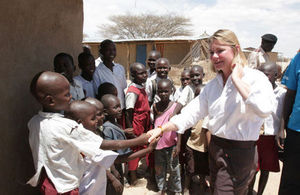DFID publishes Annual Report
DFID Annual Report and Accounts 2013 to 2014

UK Secretary of State for International Development Justine Greening during a visit to Turkana
The latest DFID Annual Report and Accounts was published on 15 July 2014. The Annual Report meets DFID’s obligation to report on its activities and progress toward the Millennium Development Goals under the International Development (Reporting and Transparency) Act 2006. It includes information on DFID’s results achieved, spending, performance and efficiency.
DFID’s report notes that priorities for the region include strengthening of democracy; promoting sustainable economic development and job creation; and delivery of health, education and social protection services – all priorities from Kenya’s Vision 2020.
Kenya’s progress on the poverty MDG (the proportion of people living below $1.25 a day) is noted as not progressing. In response the UK is supporting market development and financial inclusion - which are key ingredients to growth - and enabling more people to move out of poverty, including women and girls. It notes the poorest Kenyans live in climate vulnerable areas where a package of UKAid programmes (including cash transfers, climate change adaptation and drought management) will strengthen household resilience to shocks and stresses. DFID also has programmes aimed at helping women to access health services, particularly maternal health and family planning.
In 2013–14, DFID supported 120,000 Kenyans to cope with the effects of climate change and almost 130,000 were supported to have access to clean energy, half of whom were women. Over 3000 jobs were created; and DFID contributed further support which enabled 12.4 million people, 5 million of whom were women, to have access to financial services in the period covered by the report.
An estimated 100,000 households (665,000 people) benefited from DFID’s funded cash transfers through the Hunger Safety Net and Orphan and Vulnerable Children programmes in 2013-14. Over two thirds of these households were headed by women. About 360,000 women received support to use modern family planning methods; and almost 6.5 million bed-nets were provided, predominantly to pregnant women. On education, the report notes that 97,000 Kenyan children received support to be in primary education and to improve their learning in 2013-14.
The full report is available here